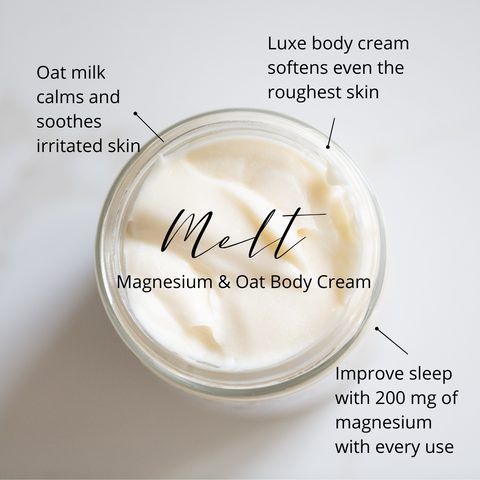Sleep math and stressfully staring at the clock often becomes a frustrating and unwelcome part of your nighttime ritual. No matter if you've journaled, meditated, practiced gentle yoga, sometimes tossing and turning is just a part of life regardless of how good your pre-sleep routine is.
But let's not forget, that getting good sleep is basically the VIP treatment for your physical and mental well-being. So, it's pretty clear that stressing about sleep just adds an unneeded layer to the whole falling/staying asleep game. And so the vicious cycle begins.
When it comes to achieving quality sleep and alleviating restless legs, magnesium is a nutrient that often flies below the radar. But here at Me Time, we know it's essential to raise awareness about the surprising benefits of magnesium, especially for women.
Many studies show that most of us get less than 7 hours of sleep each night! Even worse, 40-50% of women struggle with falling and staying asleep, restless legs, and insomnia, at all phases of life including pregnancy, perimenopause and menopause. Thanks hormones.
To make matters worse, many Americans, particularly women, are not getting enough magnesium. If you’re asking yourself, what does magnesium have to do with sleep and restless legs? Keep reading and let’s explore why this micronutrient isn’t getting enough credit–especially when it comes to our sleep.
Magic of Magnesium: What is it good for?
Magnesium is literally found in every cell in your body. It is involved in hundreds of biochemical reactions that affect energy production, our muscles and nerves. The benefits of Magnesium are nearly endless when it comes to the body.
It's actually involved in over 300 different processes and over 600 biochemical reactions that affect energy production, hormone regulation, muscle and nerve functions, blood sugar and blood pressure regulation, and also our bone formation. Literally everything!
Yet more than half of Americans are deficient. Approximately half of the US population consumes less than the required amount of magnesium. Even those who strive for better nutrition in whole foods can fall short, due to magnesium removal during food processing.
Scientific Backed Benefits of Magnesium
Sweet Dreams💤
“Magnesium is a natural relaxant that helps regulate sleep patterns” says Wendie Taylor, a Registered Dietitian Nutritionist and women’s health and perimenopause expert. “Magnesium supplementation can improve sleep quality, reduce symptoms like insomnia, and decrease the time it takes to fall asleep.”
Here's a sleep study focused on insomnia
46 elderly patients with insomnia were separated into two groups, one took 500mg of magnesium and the other had a placebo. The group that took magnesium for 8 weeks slept longer, got to sleep faster, and had better overall sleep quality compared to the group that didn’t, according to a study in the journal of research in medical sciences.
Getting quality sleep is essential for that radiant no makeup needed glow. Magnesium helps regulate your body's internal clock known as your circadian rhythm, making sure you get restful sleep. It even promotes relaxation and reduces anxiety by regulating neurotransmitters GABA that calm the nervous system. So, say goodbye to a restful night of tossing and turning.
Soothe Anxiety Naturally 😌
“Magnesium plays a pivotal role in regulating the nervous system by helping to calm and relax it”, says Taylor. “Magnesium supports the production of GABA, a neurotransmitter that reduces stress and anxiety.”
Life gets busy to say the least, a little anxiety is normal, but too much can be overwhelming. Magnesium acts as a natural calming ability, helping to reduce anxiety levels. It regulates the release of stress hormones and supports a balanced mood. Hello, inner peace!
According to Dr Michele Duffy and Kate Duffy, NBHWC, the mother and daughter duo at SHE Health, a Functional Medicine practice dedicated to digging into the root causes of stress and anxiety, ‘magnesium is one of the first nutrients the stress response uses up to create serotonin.’ Hence magnesium deficiency if you’re often stressed.
“In perimenopause and menopause our estrogen levels are naturally declining. Estrogen is important in nervous system regulation.” We’re looking at you serotonin. “In a state of stress, serotonin is vital in calming the cortisol response. Without estrogen it’s easy to stay in a chronic state of stress.” And why so many functional and integrative doctors recommend magnesium to help promote restfulness.
Bye Restless Legs and Muscle Cramps🦵
Ever experienced those annoying muscle cramps or uncontrollable urge to move your legs during the night? What a pain! SHEHealth also shares that ‘restless legs and muscle cramps can be worsened by magnesium deficiency.’
Magnesium supports nerve function, relaxes the muscles, improves muscle function and prevents excessive contraction, which means fewer cramps and less twitching. It's like a gentle massage from the inside out, calming those restless legs.
Another small study showed that patients taking magnesium and B6 supplements were able to greatly reduce the severity of symptoms with restless leg syndrome and improve their sleep quality.

How to Add More Magnesium to your Daily Routine - Skin & Gut Connection
I’m no different. The struggle with poor sleep, muscle cramps, and restless legs is real. Frustrated and exhausted, I tried everything from magnesium supplements, magnesium sprays to melatonin. But magnesium supplements gave me belly cramps and more digestive issues and magnesium sprays burned and irritated my skin, so I took matters into my own hands.
Introducing Melt, our Magnesium and Oat Body Cream. It's the perfect night time routine to soften and smooth skin and promote a restful night's sleep.
While magnesium supplements are available, it's always beneficial to include antioxidant and magnesium-rich skin foods into your diet. Here are some foods that are excellent sources:
- Dark Leafy Greens
- Nuts and Seeds
- Whole Grains
- Legumes
- Avocados
- Dark Chocolate
As we age, it can become challenging to meet your needs with food alone. Several factors contribute to this including our bodies might become less efficient at absorbing magnesium from the foods we eat. Secondly, as we age, appetites decrease or we might have specific dietary restrictions that could limit the intake of magnesium-rich foods. Also, certain medications can interfere with the absorption or increase loss through urine. Due to these factors, it might be beneficial to consider supplementation.
But do magnesium lotions actually work?
Slathering on a magnesium lotion, like Melt Magnesium and Oat Body Cream as a part of your night time ritual not only promotes better sleep, relaxes muscles, calms your mind, the repairing moisturizing oils and butters with soothing oat gifts softer intensely hydrated restored skin.
Our ultra luxurious body cream is next level. Less thick than a body butter, richer than a lotion, but sinks in like a dream. The Best Part? 200 mg of Magnesium, a superhero mineral in each tablespoon of Melt Magnesium Body Cream encourages improved restful sleep and calms muscles WITHOUT all the crappy (pun intended) side effects Yes please! And That’s how Melt was born.
Pro Tip: Slathering a heaping tablespoon of all over your feet and entire body (neck down).
Remember, above all, getting good sleep is a key part of a holistic and healthy lifestyle. 😴So, here's to a more relaxed, rejuvenated you, with magnesium by your side! Sweet dreams and less stressful days ahead! ✨🌙
Nutrients 2018, 10(12), 1863; https://doi.org/10.3390/nu10121863
J Res Med Sci. 2012 Dec; 17(12): 1161–1169.
BMC Complement Med Ther. 2023; 23: 1.
Published online 2022 Dec 31. doi: 10.1186/s12906-022-03814-8






Leave a comment